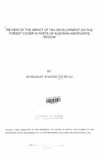| dc.description.abstract | The development of tea was highly rated in its economic inducements and returns to the
country and its people, nonetheless benefits from it led to aggressive exploitation of land.
Without paying much heed to the impact on forest cover, the tea industry started and
continued expanding very rapidly between 1960 and 1980. This was in areas east of the Rift
Valley that were formerly forested. Instead of tea development being done along side forest
cover conservation, the process of tea development was emphasized and it took the trend of
depleting forest resources and rendering them essentially non-renewable. The research
question for this study is the impact of tea development on forest cover in parts of Eastern
Aberdares. This study was approached through examination of three overlapping issues on
tea development:
1) Why was tea development undertaken in the Aberdares region and how did its
establishment impact on forest cover?
2) Is woodfuel the best alternative to sustain tea production?
3) Why is a renewable resource (woodfuel) being treated as a non-renewable resource?
To answer these questions, the study used data and imageries gathered from the field, UNEP,
forestry department and the tea sector. These were subjected to exploratory statistical
analysis and spatial analysis.
Data analysis gave answers to the study questions and the results indicated that the tea sector
contributed gradually towards forest cover loss over the years. The depletion of forest cover
was very effective as the government provided supportive regulations, enforcement and
monitoring machinery and ultimately marketing outlets for tea. The tea sector's use of
wood fuel energy for processing of green tea was viewed as the best option due, to its cheap
price, availability as a local resource, reduction of flight of foreign exchange in the purchase
of fossil fuel and being also environmentally friendly.
The study concluded that tea development had a significant impact on forest cover in its
acreage expansion whereas woodfuel use had no impact. This led to recommendations that
environmentally friendly policies should be promoted for sustainable tea production. | en |

